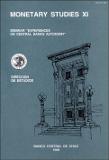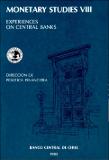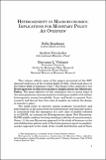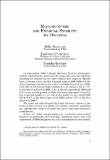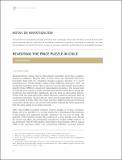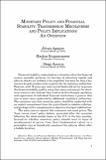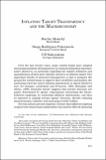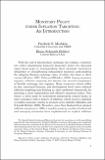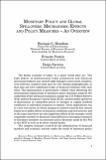Search
Now showing items 1-10 of 518
Monetary studies
En portada: "Experiences on central bank autonomy".
Experiences on central banks
Seminar efected by the Central Bank of Chile, on November 1981.
Heterogeneity in macroeconomics: implications for monetary policy an overview
can inform the design of monetary policy....
Macroeconomic and financial stability: an overview
On September 2008 Lehman Brothers filed for bankruptcy and the world became aware that the financial crisis that had been unfolding for months was far more serious than expected. Months later it became clear that the financial crisis of 2008-2009 was the worst economic downturn since the Great Depression ...
Revisiting the price puzzle in Chile
Economic theory argues that a contractionary monetary policy has a negative impact on inflation. Despite this, evidence from the empirical literature frequently finds that the estimated impulse-response function of a vector autoregressive (VAR...
International risk spillovers: implications for emerging markets’ monetary policy frameworks with an application to Chile
Among the factors behind international spillovers, U.S. monetary policy developments retain a major influence. Such developments
drive the global financial cycle as strongly demonstrated by Rey (2013), Miranda-Agrippino and Rey (2020), Miranda-Agrippino and
Rey (2021). The dramatic U.S. monetary ...
Monetary policy and financial stability: transmission mechanisms and policy implications: an overview
Financial stability understood as a situation when the financial system smoothly performs its function of allocating capital and adverse shocks are unlikely to be amplified has been for long a key concern for policymakers and in particular for monetary authorities. However until 10 years ago most ...
Inflation target transparency and the macroeconomy
Over the last twenty years, many central banks have adopted increasing standards of transparency in communicating their monetary policy objectives, in particular regarding the explicit definition and quantification of their price stability objective or inflation target. One important benefit of increased ...
Monetary policy under inflation targeting: an introduction
With the end of intermediate exchange rate regimes, countries are either abandoning domestic monetary policy (by choosing super-hard pegs or relinquishing their national currencies altogether) or strengthening independent monetary policymaking (by adopting floating exchange rates, of either the clean ...
Monetary policy and global spillovers: mechanisms effects and policy measures: an overview
The global economy of today 'is a small world after all.' The high degree of international trade integration and financial interconnectedness has created tight linkages across most countries even between countries that may be very distant geographically or that may not have significant trade or financial ...

